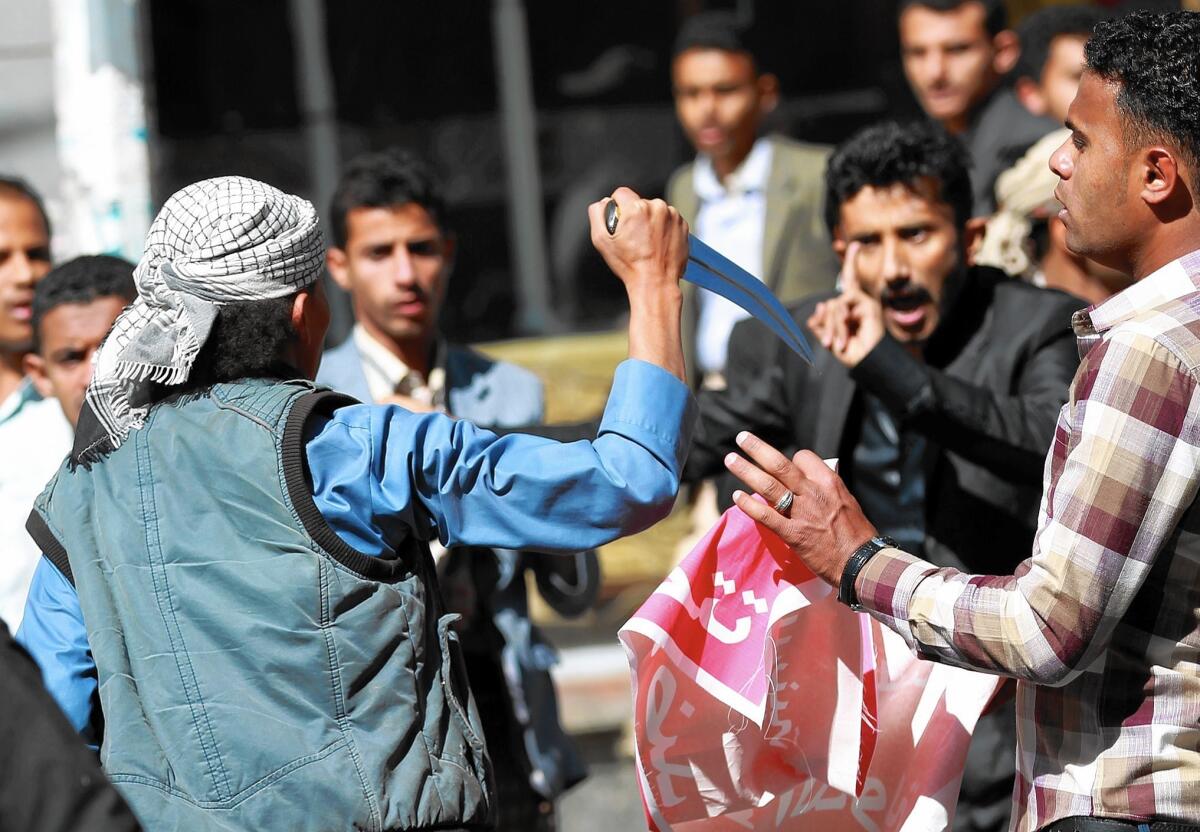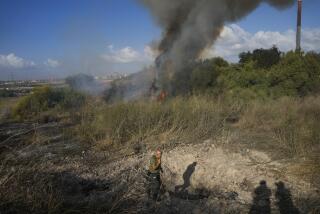Thousands in Yemen protest after government falls amid Houthi pressure

Thousands of Yemenis took to the streets of the capital and other cities Saturday to protest what many called an illegal takeover of the government by Houthi rebels.
Some demonstrators carried anti-Houthi signs and demanded a return to office of President Abdu Rabu Mansour Hadi, who announced his resignation Thursday.
The strategic nation on the southern end of the Arabian Peninsula is in the throes of a power vacuum after the unexpected action by Hadi.
Yemen, home to what U.S. authorities call Al Qaeda’s most dangerous branch, has been a key partner in U.S. counter-terrorism efforts in the Mideast.
Hadi resigned while he was a virtual prisoner of Houthi rebels who had surrounded his residence. Critics called his departure a de facto coup.
Yemen’s parliament is scheduled to meet Sunday to decide whether to accept or reject Hadi’s resignation. Hadi, who was elected in 2012 in uncontested voting, has given no indication that he will reconsider his decision to leave office. Under the Yemeni Constitution, power could pass to an interim president until elections can be organized.
Many of those marching in Sana were young people who said they had participated in the “Arab Spring” protests of early 2011 that eventually led to the ouster of longtime President Ali Abdullah Saleh. Many were clearly defiant despite the presence throughout the city of armed Houthi fighters and checkpoints.
“We are back,” said Mohammed Masoud, one of the demonstrators in Sana. “We were able to oust former President Saleh, and we are going to revolt against the Houthis.”
Houthi fighters kept a wary eye on the march but did not use force to stop it. No major incidents were reported. Similar demonstrations took place in other cities across the country, including Taizz, Dhamar and Ibb.
The political crisis also appears to have bolstered secessionist sentiment in southern Yemen, where the Houthis have little support. Until 1990, North and South Yemen were separate countries.
Some officials outside Houthi-controlled areas have said they would not follow orders from the central government in Sana until the question of the presidency was resolved.
In Marib province, the nation’s oil and energy hub east of Sana, tribesmen and others hostile to the Houthis were reported to be preparing to defend themselves against any Houthi advance.
The Houthis captured Sana in September and last week surrounded the presidential palace and residence in an apparent bid to bolster their standing in a power-sharing deal being negotiated with the government.
The heavily armed and well-organized group appeared to have the upper hand in Yemen, though Houthis, concentrated in the north, account for only about one-third of Yemen’s population.
The Houthis present themselves as crusaders against corruption and allies of the marginalized in a nation where much of the population is mired in poverty. The rebels are also fierce enemies of Al Qaeda, which has a strong presence in Yemen. Al Qaeda has been targeting Houthi noncombatants and fighters.
But the Houthis may have overplayed their advantage. Their tactics in the capital have angered many Yemenis, as was clear during Saturday’s demonstrations.
The abrupt resignation of Hadi, who had broad international backing, appears to have caught the Houthis off guard. The group has not formally outlined a plan for new leadership.
Many observers say the Houthis prefer not to run the fractious country directly, but would rather remain power brokers behind a figurehead president.
Special correspondent Al-Alayaa reported from Sana and Times staff writer McDonnell reported from Beirut.
Twitter: @mcdneville
More to Read
Sign up for Essential California
The most important California stories and recommendations in your inbox every morning.
You may occasionally receive promotional content from the Los Angeles Times.










